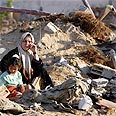
Trauma without PR
Pullout carried out against backdrop of Israel's wartime trauma repression
In the coming weeks, the word "trauma", already one of the most overused words in the Israeli lexicon, will become absolutely exploited.
We'll have trauma for Gaza evacuees dragged from their homes, their lives' work destroyed by tractors. We’ll have trauma for soldiers, who will be subject to insults, and perhaps violence, from other Jews; and national trauma that everyone - Prime Minister Ariel Sharon as well as disengagement opponents - will feel deeply.
With all this trauma, Israeli society will become even further removed from the five years that preceded the withdrawal from Gaza.
Just like we repressed the experiences of generations of soldiers implementing the occupation, the humiliation, fruitlessness and senseless blood spilled in Lebanon, and just like we repress just about everything, surely something related to our ongoing war against the Arabs will be repressed as well.
After all, if soldiers started expelling Palestinians and destroying their homes on Sunday, no one would say anything. The IDF has until today destroyed more than 3,000 homes in Gaza without so much as a peep from anyone.
With interesting timing, the "Break the silence" group recently released a report including reports from combat soldiers about what they experienced during the uprising.
Since its publication, as a result of an initiative of released soldiers who felt a need to tell the world what they went through, “Break the Silence” continues to publish testimonies.
Israel has coated itself with a layer of pain
The picture it presents is very different from previous testimonies, which were mainly about the Hebron battles.
The first batch of stories told mention names of senior commanders – those who may be on the way to a promotion and those who gave orders for acts of revenge and killing of those who did not threaten Israeli forces.
It includes truths that only few are willing to hear, about the way the army conducted its war in the territories – the war that according to accepted narratives, we had won.
The stories tell about revenge acts by elite units against Palestinian police who killed soldiers at checkpoints. Troops also told of unsupervised shootings of children, a squad commander who “demolished an entire neighborhood in Rafah within two minutes,” orders to open fire, explaining that “a man who walks the Kasbah at night should be killed” or “whoever touches the plastic roadblock on the road should be shot with live fire.” They also spoke about the killing of the man who walked with a bag of pitas.
Some of these things have been published in the press. I myself have met with several of the speakers and published parts of their stories. And that’s just the point – it’s not that they are hidden from us, we just don’t want to know about them.
Even this batch, that documents everything into one alarming picture, will pass over Israel that has coated itself with a layer of pain and a lust for revenge.
Even the trauma that thousands of soldiers have gone through during years of fighting has been suppressed and will continue to be suppressed.
While we continue to talk about the experience of uprooting, the trauma that lacks public relations will rise only in Israeli sites in India, in domestic violence, in the continuing deterioration of social norms – in any post-traumatic face that we talk about, but never associate with its origin.










